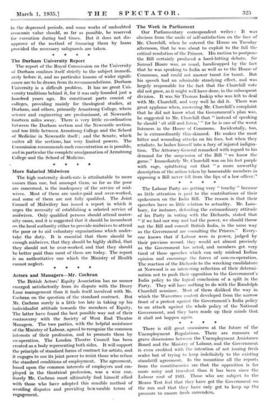The Week in Parliament Our Parliamentary correspondent writes : It
was obvious from the smile of self-satisfaction on the face of Mr. Churchill, when he entered the House on Tuesday afternoon, that he was about to exploit to the full the critical resolution of the Princes. His motion to postpone the Bill certainly produced a hard-hitting debate. Sir Samuel Hoare was, as usual, handicapped by the fact that he was speaking to India as well as to the House of Commons, and could not answer taunt for taunt. But his speech had an admirable steadying effect, and was largely responsible for the fact that the Churchill vote did not grow, as it might well have done, in the subsequent division. It was Sir Thomas Inskip who was left to deal with Mr. Churchill, and very well he did it. There was great applause when, answering Mr. Churchill's complaint that he did not know what the Government's plan was, he suggested to Mr. Churchill that " instead of speaking he should sit still and listen,' " for he is one of the worst listeners in the House of Commons. Incidentally, too, he is extraordinarily thin-skinned. He makes the most bitter and wounding attacks on his foes, but when they retaliate, he lashes himself into a fury of injured indigna- tion. The Attorney-General remarked with regard to his demand for the suspension of the Bill " we know the game." Immediately Mr. Churchill was on his feet purple with rage, spluttering out that " a more unworthy description of the action taken by honourable members in opposing a Bill never fell from the lips of a law officer."
* * * *


























































 Previous page
Previous page